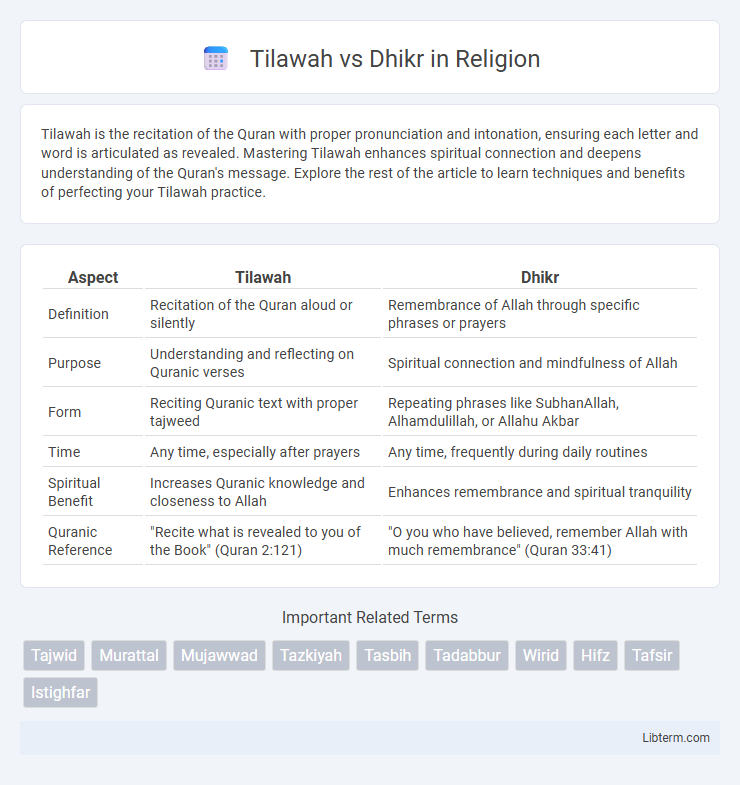Tilawah is the recitation of the Quran with proper pronunciation and intonation, ensuring each letter and word is articulated as revealed. Mastering Tilawah enhances spiritual connection and deepens understanding of the Quran's message. Explore the rest of the article to learn techniques and benefits of perfecting your Tilawah practice.
Table of Comparison
| Aspect | Tilawah | Dhikr |
|---|---|---|
| Definition | Recitation of the Quran aloud or silently | Remembrance of Allah through specific phrases or prayers |
| Purpose | Understanding and reflecting on Quranic verses | Spiritual connection and mindfulness of Allah |
| Form | Reciting Quranic text with proper tajweed | Repeating phrases like SubhanAllah, Alhamdulillah, or Allahu Akbar |
| Time | Any time, especially after prayers | Any time, frequently during daily routines |
| Spiritual Benefit | Increases Quranic knowledge and closeness to Allah | Enhances remembrance and spiritual tranquility |
| Quranic Reference | "Recite what is revealed to you of the Book" (Quran 2:121) | "O you who have believed, remember Allah with much remembrance" (Quran 33:41) |
Introduction: Understanding Tilawah and Dhikr
Tilawah refers to the recitation of the Quran with correct pronunciation and intonation, emphasizing the spiritual and linguistic connection to the divine text. Dhikr involves the remembrance of Allah through repetitive phrases or prayers, fostering mindfulness and spiritual tranquility. Both practices hold significant roles in Islamic worship, enhancing faith and devotion.
Defining Tilawah: Meaning and Significance
Tilawah refers to the precise recitation of the Quran, emphasizing correct pronunciation (tajweed) and rhythm to convey the divine message authentically. It holds immense spiritual significance as it connects believers directly with the words of Allah, enhancing understanding and devotion during worship. Unlike Dhikr, which involves repetitive remembrance of Allah's names and attributes, Tilawah uniquely merges linguistic reverence with sacred scripture.
Defining Dhikr: Essence and Purpose
Dhikr, derived from the Arabic root meaning "remembrance," embodies the spiritual practice of recalling and honoring Allah through repetitive utterances or reflections. It serves as a means to foster a deep, personal connection with the Divine, promoting mindfulness, tranquility, and spiritual purification. Unlike Tilawah, which specifically involves the recitation of the Quranic text, Dhikr encompasses a broader spectrum of devotional acts aimed at sustaining constant awareness of God's presence.
Historical Roots of Tilawah and Dhikr
The historical roots of Tilawah trace back to the revelation of the Quran to Prophet Muhammad in the 7th century, emphasizing the oral recitation and memorization of sacred texts as a core Islamic practice. Dhikr, on the other hand, developed from early Islamic devotional traditions focusing on the remembrance of God through repeated phrases or prayers, rooted in Quranic injunctions and Hadith teachings. Both practices evolved within Islamic spirituality, with Tilawah centered on Quranic recitation and Dhikr on meditative remembrance, shaping Muslim worship and identity over centuries.
Core Objectives: Tilawah vs Dhikr
Tilawah centers on the precise and melodious recitation of the Quran to enhance spiritual connection and internalize divine guidance. Dhikr involves repetitive remembrance and invocation of Allah's names and attributes to cultivate mindfulness, inner peace, and constant awareness of God's presence. Both practices aim to strengthen faith but engage different aspects: Tilawah emphasizes Quranic engagement, while Dhikr focuses on continual spiritual mindfulness.
Spiritual Benefits of Tilawah
Tilawah, the recitation of the Quran, profoundly enhances spiritual well-being by fostering a direct connection with divine guidance and increasing mindfulness of God's words. This practice nurtures inner peace, spiritual clarity, and strengthens faith through the rhythmic and melodious reading of sacred texts. Unlike Dhikr, which centers on repetitive remembrance of God's names, Tilawah immerses the soul in the Quran's holistic teachings, deepening understanding and spiritual reflection.
Spiritual Rewards of Dhikr
Dhikr, the remembrance of Allah through phrases and supplications, offers profound spiritual rewards, including inner peace, increased faith, and forgiveness of sins, which are emphasized in numerous Quranic verses and Hadiths. Unlike Tilawah, the recitation of the Quran that primarily strengthens knowledge and connection with divine scripture, Dhikr directly rejuvenates the heart and soul, fostering a constant awareness of Allah's presence. The spiritual benefits of Dhikr encompass tranquility, purification of the heart, and continuous divine blessings, making it a key practice for deepening one's spirituality in Islam.
Methods and Practices: How Tilawah and Dhikr Differ
Tilawah involves the precise recitation of the Quranic text with attention to Tajweed rules, emphasizing correct pronunciation, intonation, and rhythm, often performed individually or in a group setting. Dhikr, by contrast, consists of repetitive utterances of divine names, phrases, or prayers to invoke mindfulness of God, practiced silently or aloud without strict linguistic rules. The key difference lies in Tilawah's focus on Quranic scripture and structured recitation, whereas Dhikr centers on spiritual remembrance through flexible verbal or mental repetition.
Recommended Times for Tilawah and Dhikr
Tilawah, the recitation of the Quran, is highly recommended during the early morning hours (Fajr time) and after the obligatory prayers, offering spiritual benefits and reflection. Dhikr, the remembrance of Allah through phrases and supplications, is encouraged throughout the day, especially after each Salah and during moments of solitude for continuous mindfulness. Both practices enhance a Muslim's connection to faith, with Tilawah emphasizing Quranic engagement and Dhikr fostering ongoing spiritual awareness.
Integrating Tilawah and Dhikr into Daily Life
Integrating Tilawah and Dhikr into daily life enhances spiritual awareness by combining Quranic recitation with continuous remembrance of Allah, fostering a deep connection to faith. Scheduling specific times for Tilawah, such as after Fajr prayer, alongside habitual Dhikr during routine activities promotes mindfulness and tranquility. Utilizing mobile apps and digital reminders can support consistency and help maintain a balanced spiritual practice throughout the day.
Tilawah Infographic

 libterm.com
libterm.com